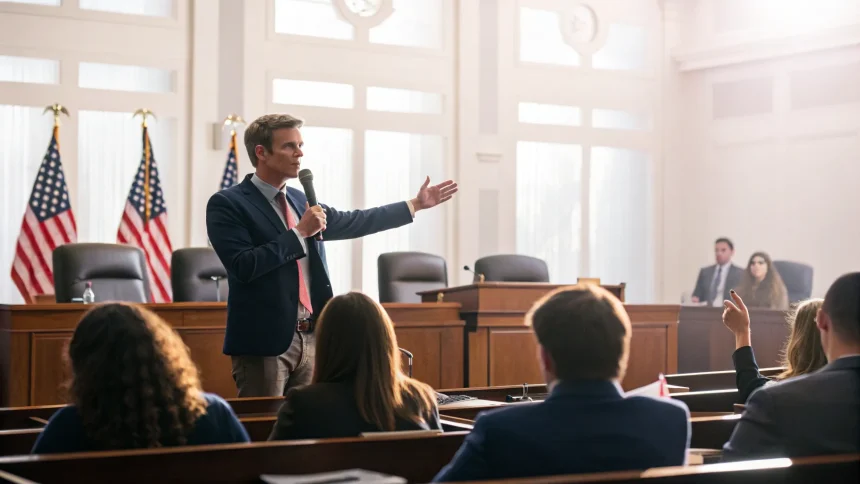A Texas Democrat is pushing back on calls to punish Del. Stacey Plaskett over text messages with Jeffrey Epstein, arguing that the exchange began with Epstein and should not cost her a committee seat. The defense comes as partisan fights over ethics and alliances resurface in Washington, with new attention on how elected officials handled contacts with the disgraced financier.
Background On A Volatile Exchange
Plaskett, the Democratic delegate from the U.S. Virgin Islands, has faced scrutiny after messages with Epstein surfaced. Epstein, who maintained a home in the territory, was a registered sex offender following a 2008 plea in Florida state court. He was later charged in federal court in 2019 and died in custody that same year.
Rep. Jasmine Crockett of Texas said timing matters and stressed that the outreach did not come from Plaskett. She noted that the messages predated Epstein’s 2019 federal case.
“Stacey didn’t initiate that chain. Jeffrey initiated that chain,” Crockett said. She added that “he had never been convicted of any federal crimes at that time.”
Plaskett has said Epstein was one of her constituents, a point that has factored into her allies’ argument that contact, while uncomfortable, was part of her role and occurred before the later federal charges.
Defense From Allies
Crockett framed the issue through the lens of prosecutorial practice. She argued that public officials and investigators often seek information from people with ties to key figures, even when those sources carry serious baggage.
“What I know of prosecutors is that they are typically talking to co-defendants. They are typically talking to the people that have the best information,” she said.
She suggested Epstein’s proximity to a president made him a potential source of insight at the time. Crockett referenced a “former attorney for the president” who had testified and said Epstein presented himself as close to that president.
“He had more information, registered sex offender or not,” Crockett said. “The bigger question is, why is it that the president was so cozy with a registered sex offender… seemingly, he had absolutely been on the plane with him. We know about the birthday card.”
Critics Raise Ethics Concerns
Ethics advocates and political opponents counter that any outreach with Epstein reflects poor judgment. They argue that elected officials should have kept their distance, given his status on sex offender registries after 2008.
They also question whether the contact gave Epstein perceived access to political influence. Some lawmakers have urged leadership to consider stripping committee roles if they find that standards were compromised.
Crockett rejected that approach. She said it would punish a member for receiving information rather than initiating it.
“Why is the president of the United States not the one that is in the hot seat for his relationship, instead of us saying… we’re going to take her off of her committee, because he decided to text her,” she said.
What The Record Shows
- Epstein pleaded guilty in 2008 to state charges in Florida and registered as a sex offender.
- He was charged in 2019 with federal sex trafficking crimes and died in jail that year.
- He cultivated ties with high-profile figures across politics, finance, and academia.
Those facts have complicated assessments of past interactions. Allies argue context and timing are critical. Critics say the warning signs were clear after 2008.
Implications For Congress
The dispute reflects a wider fight over standards for contact with controversial figures and the use of committee assignments as punishment. It also speaks to how both parties evaluate relationships tied to Epstein and what they reveal about political culture.
For Plaskett, the outcome may hinge on internal reviews and whether leaders view the exchange as part of constituent service or as a lapse in judgment. For the broader House, it raises questions about consistent rules and how they are applied across the aisle.
The latest development places new pressure on leadership to set clear expectations for member conduct, especially when messages involve figures with criminal histories. It also shifts attention to the presidents and public figures who maintained ties with Epstein. Crockett’s defense suggests Democrats will argue timing, context, and origin of contact should guide any response. What happens next will depend on whether committees open formal inquiries, and if new records reshape the narrative.







